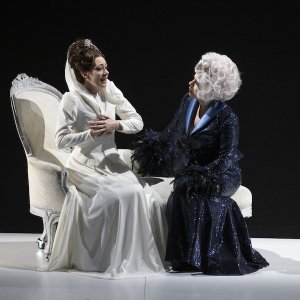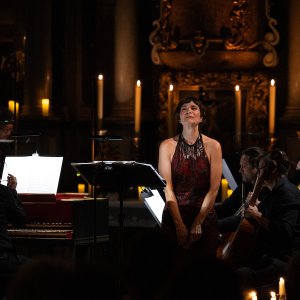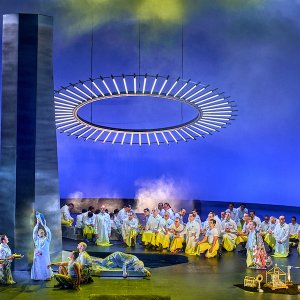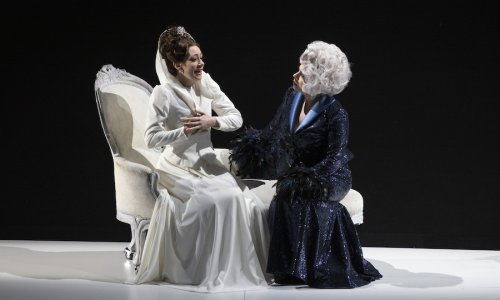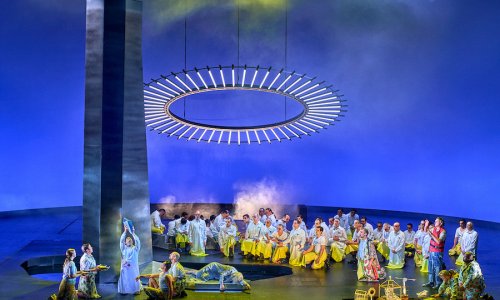
Nathalie Stutzmann: "Opera is much more than a showcase for voices"
Known for decades for her notable career as a contralto, the French Nathalie Stutzmann is now becoming known as an orchestra conductor. On the occasion of her recent debut at the Bayreuth Festival, conducting Tannhäuser, she stars in our September web cover, while she starts her second year as Music Director with the Atlanta Symphony Orchestra.
How did you experience the undoubted success of your debut in Bayreuth, leading Tannhäuser?
For me the success of this debut in Bayreuth has been something incredible, it means so much as a Wagnerian , its truly exceptionnal and I confess that even in my strongest dreams I did not expect it to be so marvelous .
In the many years I have been coming to Bayreuth, this is the second time I have seen such an immediate and impressive standing ovation. The previous one was with the last Isolde here by Nina Stemme, to give you an idea.
Thank you. The truth is that it was a night to remember. There is something magical and truly unique here in Bayreuth: devotion. Because everyone who is here is because they want to, no one has been imposed; everyone is at the service of music, regardless of the discomfort of the pit, the heat... Wagner wanted to create a utopia and it came true. For me this is the absolute ideal of what a music festival should be.
I'm curious, before the premiere, did you have a chance to talk to Oksana Lyniv? As you well know, she already made her debut here with The Flying Dutchman, in fact she being the first woman to conduct in the Bayreuth moat.
Well, not really, because we didn't know each other until we met here this summer; we have not had the opportunity to talk before these performances of Tannhäuser.
Of course I was aware of the difficulties and peculiarities of this room. I had heard tremendous stories about great directors crashing here. And it is true that it is complicated, you cannot trust your previous experience with other rooms.
I went as much as possible to the rehearsals of other colleagues, like Pablo Heras-Casado, to become aware of the sound, but in reality there is no real impression until you are in the pit conducting.
And once there, everything is very different and complicated: you have to be constantly in contact by phone, there is very little space and in my case I almost always have to direct sitting down, because I am quite tall, and that also conditions everything. I thought that everything was going to turn out fatally but it turned out very well (laughs). Strangely I felt very comfortable to deal with it .
Tannhäuser is also an especially choral opera, you have to coordinate many soloists, the choir... It is especially demanding in this sense.
Absolutely. In the second act there are 250 people waiting for my baton, it's a real madness. I think there's something instinctive about this work and in rooms and on occasions like these. If you're too cerebral, I think things get tense. Maybe I'm wrong, but I think it's more a matter of trust and instincts. Trust in what you hear and feel, but also trust in others, trust that what you don't hear, because the physical conditions of the room don't allow it, is fine, it's going to turn out fine. Because the problem here in Bayreuth is to underline things too much, to overreact when you think something is wrong or when you don't hear something. The problem, I think, is that some directors might trust themselves more than others (laughs).
So different is the acoustic experience in this room, then?
What the director hears is totally different from what is heard in the room. You have to do a constant exercise of imagination, to transpose what is playing in the pit and think how it will sound in the room. It is really complicated, it is a work of volumes and balances that would be impossible without good assistants. It takes speed to react and memory to remember what has been tested in trials. Basically you have to put other ears and forget all what you know and do in regular pit .
Another important issue here in Bayreuth is breathing, with that small but significant gap between the pit and the hall, with the impossibility of real eye contact with the singers. You, precisely, as a singer, will have a very fine-tuned sense of breathing, I imagine.
Having been a singer for so many years, yes... but breathing is something that has worried me a lot, from when I was a pianist, when I played the bassoon, when I was a cellist... I think that in Bayreuth it is something very important, of course it is, to achieve that the whole set , everyone breathe naturally is essential. You know, this is like swimming... they can explain to you what it’s like, what you have to do... but until you’re in the water, you don’t really know.
Was this from Bayreuth your first Tannhäuser?
I did Tannhäuser seven years ago, in the French Paris version, and for me these performances in Bayreuth have been like re-studying the work, like my first time with it in its original version, let’s say.
Do you have a preference for any of the versions of the work?
The Dresden version is somewhat more direct and honest, I think. I think it’s easier to execute; there are very complicated , almost un playable passages in the other version, the Dresden version is more concise and better resolved in general terms.
Would you like to do the French version of Tannhäuser here in Bayreuth?
Well it would be something truly revolutionary, knowing it has been played only 3 times in Paris at the creation ! It is a very interesting version for its connections with french music composers , especially since Wagner worked very intensively from the French text, because he wanted to have a great success in Paris, even if it was a disaster for him in the end.
Interesting to hear how much the choice of a language influence the perception we have for the music . Katharina Wagner is a woman with a very open mind. Let’s not dismiss the idea (laughs).
Wagner is an important composer for you. Do you have more of his titles on his agenda?
I’ll be directing The Flying Dutchman in May of next year and I also have some projects with Tristan on the agenda. And of course I hope to be able to lead the Ring one day. Actually, the entire Wagnerian repertoire fascinates me and will be a center of my life.

Having been a singer, do you think it’s a cliché to say that you’re a conductor with whom singers feel more comfortable, precisely because you anticipate their needs?
I hope so (laughs). You know, the problem is that some singers think that because of my solo career, I can be a good accompanist for them; but an opera director is not an accompanist, he is something else.
Even in bel canto?
Yes, even in bel canto. Accompanying means helping, following in some way, in the sense of waiting, reacting... But directing is something more complex and global, a matter of balance between the orchestra and the singers. It is about inspiring, giving confidence , helping and give freedom when appropriate, and ordering when it is due. Not long ago I read an interview with Riccardo Muti in which he precisely said that he was very disappointed because the Italian repertoire was relaxing its standards a lot, due to the lack of musical work beyond mere accompaniment. I couldn't agree more with that statement. For me, opera is much more than a showcase for voices; it is a text, a story, a musical journey through a drama.
Now you mention Riccardo Muti, who was in charge of the Philadelphia Orchestra for a few years. You are there now as a principal guest conductor. In your experience, is the reality of orchestras in the USA and in Europe very different?
There are many differences, yes. To begin with, the very figure of a regular director, which in the USA includes many more responsibilities and tasks, at an administrative level.
Managing an orchestra in America is complicated because you have to balance artistic aspirations with the economic reality of sponsors and the demands of the audience. There is less room to take risks, in terms of programming, precisely because there is no public financing structure behind it.
On the other hand, the rehearsal time is much shorter in the USA, practically one and a half days per week compared to the three days that there are normally in Europe. The level in America is very professional, but it is a different working method.
How is the Philadelphia Orchestra, one of the big five in the USA?
It is a great orchestra, with its own, historical sound, famous for its strings. The training is extraordinary, without a doubt. It is very interesting to see what kind of work is carried out with top-level orchestras; with them everything happens very quickly, they are great for their flexibility, for their resolution capacity.
She is currently the Music DIrector of the Atlanta Symphony, effective season 22/23.
Yes, that's right, the Atlanta Symphony Orchestra is another great orchestra, included in the big ten of American formations. It is an orchestra with a great musicality and sensitivity quality, which is not always found and which is very necessary: its love for work.
Out of curiosity, how many women are on the staff there in Atlanta?
Half the musicians, more or less. Like in normal life, no more no less. I don't think it was premeditated. The auditions there are blind, behind a curtain, there is no quota for women, I mean.
I guess the question is a bit tedious, still at this point, but as a well-established female conductor, what advice would you give to a young woman with a vocation for conducting?
It’s complicated because my career as a director was never in my plans. I don’t even see myself as a female director, I am a director !. I am a person who is dedicated to making music, at this moment in front of various orchestras.
It is true that at the beginning, ten years ago, I found more reactions, rejections, but everything has become much more normal and much easier today, progress has fortunately been very fast.
And you know one thing, most of the time, the most hurtful reactions did not come from men but from women. It is surprising how many women do not assume that one of them can occupy a position of authority. We have a serious problem there.
No advice then for the new generations?
I don’t feel in a position to give anyone advice on anything (laughs). What can I say to a young woman who has a vocation for conducting an orchestra... I suppose that my activity, the very fact of conducting these days in Bayreuth, can be inspiring. But it’s hard to generalize… when there are so many variables at play in a race.
To be a conductor you have to have a strong, confident personality, with a very strong conviction to do this job. You have to feel it as a vital need, otherwise it can be a nightmare.
Is her experience making music now as a director much different than it was in her days as a singer?
It's very different, yes. As a singer you mainly have to take care of yourself, as a director you take care of others. A singer is an instrument, whereas a conductor deals with a whole group of them.
Have you had any role models in conducting, teachers who have particularly helped or inspired you?
I started my days as a singer alongside mythical directors like Karajan, I was very lucky. And when I was tempted to direct, I did ask directors and colleagues like Simon Rattle or Seiji Ozawa for advice. For me, with a ready-made reputation as a singer, it was a big risk to take this path and not live up to it. But they encouraged me, they gave me the confidence I needed, and the truth is that I keep in contact with Simon often.
I think I’ve been lucky enough to have the best conducting school one can have, which is to attend hundreds of hours of rehearsal as a singer, watching the greatest perform. And I was like a sponge, I absorbed everything during rehearsals and learned everyday.
In this sense, it is important to admire many people, not just a few, because in that case you tend to copy what they do.
So, don’t you recognize yourself with any specific management school?
Not especially. I also think that this idea of schools and traditions is disappearing nowadays... My teacher, Jorma Panula, is Finnish and he does not come from any tradition, rather he has started it himself, training many established conductors today.
His working method is fantastic because he never tells you how to conduct, First of all he ired only students he consider having a natural talent for conducting . Then he tells you, study the score ! and then he simply puts you in front of an orchestra so you can do it and he gives you guidelines. That is why he told her that it is really impossible to give advice on this job, because it is something that is learned in a unique way in each case, in a very instinctive way, and above all, you learn as you go, neither more nor less.
Does he have plans to direct soon in Spain?
Spain is a country that I love and where I was able to sing a lot during a period of my life. A couple of years ago I was conducting with the National Orchestra of Spain. At this moment I have no concrete plans there. I received a proposal from the Teatro Real but I didn’t have the free dates, unfortunately. I hope I can do an opera there in Spain soon.
We have spoken before, for obvious reasons, of the German repertoire, of Wagner in particular, but you are French. What preferences do you have in the French repertoire? I’ll ask you another way. Of these three operas that I propose, which one would you choose? Dialogues des Carmélites, Pelléas et Mélisande or Saint François d’Assise ?
Probably Dialogues of Carmelites, it’s a fabulous opera. I never got to sing it, my mother did on her day.
And what would be your most coveted title from the French repertoire right now?
I’ll be doing Carmen soon, a title that I really want to direct. It is a title with which I have a long personal history, from my childhood.
Her recordings of Beethoven’s piano concertos with the Philadelphia Orchestra, with Haoechen Zhang as soloist, have recently appeared. Do you have any other recording plans on the table right now?
I now work with the Warner label and we have several projects on the table, but I can't reveal them yet (laughs). In addition to those concerts for Beethoven, from 2022, that same year a recording with the harpist Xavier de Meistre was also published that has been awarded an Opus Klassic and recognized.
Photo: © Simon Fowler




